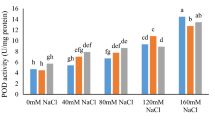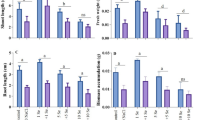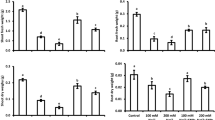Abstract
Nanoparticles are receiving many interests due to their broad efficiency in mitigating environmental stresses. The purpose of this research was to study the potential of selenium-nanoparticles (Se-NPs) to mitigate the adverse effects of salt stress on growth, physiology, and gene expression of Melissa officinalis. The pot experiment was conducted in a factorial based on completely randomized design (CRD) with three Se-NPs concentrations (0, 50, and 100 mg L−1) and four salinity levels (0, 50, 100, and 150 mM NaCl). The foliar spray of Se-NPs improved the growth of M. officinalis plants at different salinity concentrations, from which the most effective was 50 mg L−1. Plant growth decreased by progressing salinity concentration so that the minimum growth was observed at 150 mM NaCl. The Se-NPs improved salt tolerance in M. officinalis by decreasing lipid peroxidation through increased activity of antioxidant enzymes viz. superoxide dismutase (SOD), catalase (CAT), and peroxidase (POX). Furthermore, exposure to Se-NPs enhanced the transcript levels of phenylalanine ammonia-lyase and rosmarinic acid (RA) synthase genes in lemon balm plants under salt conditions. Plants treated with 100 mg L−1 Se-NPs at non-saline conditions revealed the highest RA accumulation. According to the findings, we suggest both 100 mg L−1 Se-NPs to alleviate the adverse effects of salinity on in the M. officinalis, as well as the biosynthesis pathway of RA as a valuable secondary metabolite.






Similar content being viewed by others
Data availability
All data are subject to transparency.
Code availability
Not applicable.
References
Akcin A, Yalcin E (2016) Effect of salinity stress on chlorophyll, carotenoid content, and proline in Salicornia prostrata pall. And Suaeda prostrata pall. Subsp. prostrata (Amaranthaceae). Braz J Bot 39:101–106. https://doi.org/10.1007/s40415-015-0218-y
Ashraf MA, Akbar A, Parveen A, Rasheed R, Hussain I, Iqbal M (2018) Phenological application of selenium differentially improves growth, oxidative defense and ion homeostasis in maize under salinity stress. Plant Physiol Biochem 123:268–280. https://doi.org/10.1016/j.plaphy.2017.12.023
Astaneh RK, Bolandnazar S, Nahandi FZ, Oustan S (2018) The effects of selenium on some physiological traits and K, Na concentration of garlic (Allium sativum L.) under NaCl stress. Inf Process Agric 5:156–161. https://doi.org/10.1016/j.inpa.2017.09.003
Babajani A, Iranbakhsh A, Ardebili ZO, Eslami B (2019) Differential growth, nutrition, physiology, and gene expression in Melissa officinalis mediated by zinc oxide and elemental selenium nanoparticles. Environ Sci Pollut Res 26:24430–24444. https://doi.org/10.1007/s11356-019-05676-z
Bates LS, Waldren RP, Teare I (1973) Rapid determination of free proline for water-stress studies. Plant Soil 39:205–207. https://doi.org/10.1007/BF00018060
Beauchamp C, Fridovich I (1971) Superoxide dismutase: improved assays and an assay applicable to acrylamide gels. Anal Biochem 44:276–287. https://doi.org/10.1016/0003-2697(71)90370-8
Bekhradi F, Delshad M, Marín A, Luna MC, Garrido Y, Kashi A, Babalar M, Gil MI (2015) Effects of salt stress on physiological and postharvest quality characteristics of different Iranian genotypes of basil. Hortic Environ Biotechnol 56:777–785. https://doi.org/10.1007/s13580-015-1095-9
Bui E (2013) Soil salinity: a neglected factor in plant ecology and biogeography. J Arid Environ 92:14–25. https://doi.org/10.1016/j.jaridenv.2012.12.014
Diao M, Ma L, Wang J, Cui J, Fu A, Liu H-Y (2014) Selenium promotes the growth and photosynthesis of tomato seedlings under salt stress by enhancing chloroplast antioxidant defense system. J Plant Growth Regul 33:671–682. https://doi.org/10.1007/s00344-014-9416-2
Döring AS, Pellegrini E, Della Batola M, Nali C, Lorenzini G, Petersen M (2014) How do background ozone concentrations affect the biosynthesis of rosmarinic acid in Melissa officinalis? J Plant Physiol 171:35–41. https://doi.org/10.1016/j.jplph.2013.11.005
Eudes Filho J, Silveira D, Soares AIC, Carneiro FP, de Assis MS, Leite FB, Ferreira (2017) Effects of lemon balm (Melissa officinalis) on behavioral deficits and memory impairment of rats surviving sepsis. J Med Plant Res 11:153–160. https://doi.org/10.5897/JMPR2016.6266
Ghazi D (2018) The contribution of Nano-selenium in alleviation of salinity adverse effects on coriander plants. J Soil Sci Agric Eng 9(12):753–760
Hamaguchi T, Ono K, Murase A, Yamada M (2009) Phenolic compounds prevent Alzheimer’s pathology through different effects on the amyloid-β aggregation pathway. Am J Pathol 175:2557–2565. https://doi.org/10.2353/ajpath.2009.090417
Hasanein P, Riahi H (2015) Antinociceptive and antihyperglycemic effects of Melissa officinalis essential oil in an experimental model of diabetes. Med Princ Pract 24:47–52. https://doi.org/10.1159/000368755
Hawrylak-Nowak B (2009) Beneficial effects of exogenous selenium in cucumber seedlings subjected to salt stress. Biol Trace Elem Res 132:259–269. https://doi.org/10.1007/s12011-009-8402-1
Heath RL, Packer L (1968) Photoperoxidation in isolated chloroplasts: II. Role of electron transfer. Arch Biochem Biophys 125:850–857. https://doi.org/10.1016/0003-9861(68)90523-7
Hosnedlova B, Kepinska M, Skalickova S, Fernandez C, Ruttkay-Nedecky B, Peng Q, Barao M, Opatrilova R, Zidkova J, Bjørklund G, Sochor J, Kizek R (2018) Se-NPslenium and its nanomedicine applications: a critical review. Int J Nanomedicine 13:2107. https://doi.org/10.2147/IJN.S157541
Jahanban-Esfahlan R, Seidi K, Monfaredan A, Shafie-Irannejad V, Abbasi MM, Karimian A, Yousefi B (2017) The herbal medicine Melissa officinalis extract effects on gene expression of p53, Bcl-2, Her2, VEGF-A and hTERT in human lung, breast and prostate cancer cell lines. Gene 613:14–19. https://doi.org/10.1016/j.gene.2017.02.034
Jiang C, Zu C, Lu D, Zheng Q, Shen J, Wang H, Li D (2017) Effect of exogenous selenium supply on photosynthesis, Na+ accumulation and antioxidative capacity of maize (Zea mays L.) under salinity stress. Sci Rep 7:42039. https://doi.org/10.1038/srep42039
Kiarostami K, Mohseni R, Saboora A (2010) Biochemical changes of emopenRosmarinus officinalisemclose under salt stress. J Stress Physiol Biochem 6(3):114–122
Kirti K, Amita S, Priti S, Mukesh Kumar A, Jyoti S (2014) Colorful world of microbes: carotenoids and their applications. Adv Biol 2014:1–13. https://doi.org/10.1155/2014/837891
Lichtenthaler HK, Wellburn AR (1983) Determinations of total carotenoids and chlorophylls a and b of leaf extracts in different solvents. Biochem Soc Trans 11(5):591–592. https://doi.org/10.1042/bst0110591
Mohamed AKS, Qayyum MF, Abdel-Hadi AM, Rehman RA, Ali S, Rizwan M (2017) Interactive effect of salinity and silver nanoparticles on photosynthetic and biochemical parameters of wheat. Arch Agron Soil Sci 63:1736–1747. https://doi.org/10.1080/03650340.2017.1300256
Morales-Espinoza MC, Cadenas-Pliego G, Pérez-Alvarez M, Hernández-Fuentes AD, Cabrera dela Fuente M, Benavides-Mendoza A, Valdés-Reyna J, Juárez-Maldonado A (2019) Se Nanoparticles Induce Changes in the Growth, Antioxidant Responses, and Fruit Quality of Tomato Developed under NaCl Stress. Molecules (Basel, Switzerland) 24:3030. https://doi.org/10.3390/molecules24173030
Noguchi-Shinohara M, Ono K, Hamaguchi T, Iwasa K, Nagai T, Kobayashi S, Yamada M (2015) Pharmacokinetics, safety, and tolerability of Melissa officinalis extract which contained rosmarinic acid in healthy individuals. Alzheimers Dement 11:P902. https://doi.org/10.1371/journal.pone.0126422
Oliveira HC, Gomes BC, Pelegrino MT, Seabra AB (2016) Nitric oxide-releasing chitosan nanoparticles alleviate the effects of salt stress in maize plants. Nitric Oxide 61:10–19. https://doi.org/10.1016/j.niox.2016.09.010
Park WT, Arasu MV, Al-Dhabi NA, Yeo SK, Jeon J, Park JS, Lee SY, Park SU (2016) Yeast extract and silver nitrate induce the expression of phenylpropanoid biosynthetic genes and induce the accumulation of rosmarinic acid in Agastache rugosa cell culture. Molecules 21:426. https://doi.org/10.3390/molecules21040426
Pereira G, Molina SMG, Lea P, Azevedo RAD (2002) Activity of antioxidant enzymes in response to cadmium in Crotalaria juncea. Plant Soil 239:123–132. https://doi.org/10.1023/a:1014951524286
Sadat Ejtahed R, Radjabian T, Tafreshi SAH (2015) Expression analysis of phenylalanine ammonia lyase gene and rosmarinic acid production in Salvia officinalis and Salvia virgata shoots under salicylic acid elicitation. Appl Biochem Biotechnol 176:1846–1858. https://doi.org/10.1007/s12010-015-1682-3
Sairam RK, Rao KV, Srivastava G (2002) Differential response of wheat genotypes to long term salinity stress in relation to oxidative stress, antioxidant activity and osmolyte concentration. Plant Sci 163:1037–1046. https://doi.org/10.1016/S0168-9452(02)00278-9
Sajyan TK, Alturki SM, Sassine YN (2020) Nano-fertilizers and their impact on vegetables: contribution of Nano-chelate super plus ZFM and Lithovit®-standard to improve salt-tolerance of pepper. Annal Agr Sci. https://doi.org/10.1016/j.aoas.2020.11.001
Sharopov F, Setzer WN (2018) Medicinal Plants of Tajikistan. In: Egamberdieva D, Öztürk M (eds) Vegetation of Central Asia and Environs Springer, Cham. https://doi.org/10.1007/978-3-319-99728-5_7
Siddiqui MH, Al-Whaibi MH, Faisal M, Al Sahli AA (2014) Nano-silicon dioxide mitigates the adverse effects of salt stress on Cucurbita pepo L. Environ Toxicol Chem 33:2429–2437. https://doi.org/10.1002/etc.2697
Sytar O, Brestic M, Zivcak M, Olsovska K, Kovar M, Shao H, He X (2017) Applying hyperspectral imaging to explore natural plant diversity towards improving salt stress tolerance. Sci Total Environ 578:90–99. https://doi.org/10.1016/j.scitotenv.2016.08.014
Tepe B (2008) Antioxidant potentials and rosmarinic acid levels of the methanolic extracts of Salvia virgata (Jacq), Salvia staminea (Montbret & Aucher ex Bentham) and Salvia verbenaca (L.) from Turkey. Bioresour Technol 99:1584–1588. https://doi.org/10.1016/j.biortech.2007.04.008
Zahedi SM, Abdelrahman M, Hosseini MS, Hoveizeh NF, Tran L-SP (2019) Alleviation of the effect of salinity on growth and yield of strawberry by foliar spray of selenium-nanoparticles. Environ Pollut 253:246–258. https://doi.org/10.1016/j.envpol.2019.04.078
Acknowledgments
The authors would like to thank the staff of the Islamic Azad University (IAU) laboratory in Neyshabur (Iran) for their effective cooperation.
Funding
This study was financially supported by Islamic Azad University, Damghan Branch (Iran).
Author information
Authors and Affiliations
Contributions
SGH performed the experiments, analyzed the data, and drafted the paper. NM and ASA designed and supervised the experiments, analyzed the data, and drafted the paper. FSN designed the experiments and analyzed the data. All the authors read the final manuscript and approved the submission.
Corresponding author
Ethics declarations
Conflict of interest
The authors have no conflict of interest to declare.
Additional information
Publisher’s note
Springer Nature remains neutral with regard to jurisdictional claims in published maps and institutional affiliations.
Rights and permissions
About this article
Cite this article
Ghasemian, S., Masoudian, N., Saeid Nematpour, F. et al. Selenium nanoparticles stimulate growth, physiology, and gene expression to alleviate salt stress in Melissa officinalis. Biologia 76, 2879–2888 (2021). https://doi.org/10.1007/s11756-021-00854-2
Received:
Accepted:
Published:
Issue Date:
DOI: https://doi.org/10.1007/s11756-021-00854-2




